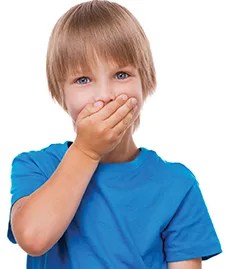Whose language is the worst? (A) Yours, (B) Your grade schooler’s, or (C) Ice-road truckers? Don’t curse yourself for setting a bad example, just follow our advice—and remember that sometimes bad words come out of the mouths of good kids.

Let’s face it: Cursing is epidemic. How did we all get so vulgar? Just listen to Oscar-nominated movies, award-winning TV scripts, and pop music lyrics. Whether the media created a foul-mouthed audience or the public is mirrored in the media’s vocabulary is one of those old chicken-or-the-egg conundrums. Regardless, curse words fill the air everywhere.
And yet, when your kid enters the cussing club, it’s a shocker. One day, my husband Michael sat with his 3-year-old grandson on his knee, waiting for Dad’s van to pull into the driveway with his other siblings, when the little guy began chanting “dumbass, dumbass.” “The boy wasn’t calling me a dumbass,” Michael said afterward. “I don’t think he even knew what the word meant. Needless to say, I was taken aback.”
Cursing in the Classroom
Kids repeat what they hear, of course. Yet it’s not only at home that kids pick up expletives. Colorful vocabulary comes from peers on the school bus and in class, and even from some unexpected sources. “Unfortunately, many of the kids tell me teachers curse in the classroom,” says Felice Niland, a social worker at Dodd Middle School in Freeport. Teachers, like parents, slip up sometimes.
Considering the uptick in bad words, the National Education Association has published guidelines for teachers on how to respond to a student using curse words. They are, in brief:
• Don’t laugh or register shock, anger, or embarrassment.
• Calculate if the student knows the meaning of what he’s saying. (Chances are our little “dumbass” chanter had no idea his words were a mean insult.)
• Gauge what’s behind the behavior. Is the child angry, trying to be class clown, in need of attention, or going for shock value?
Depending on the situation, a teacher can ignore the outburst or suggest the student find another word that is more appropriate. A bad-language incident can be turned into a learning experience. If the behavior is serious or repeats itself, then the teacher can decide if a confrontation is in order or if the student’s behavior merits calling in parents for a conference.
Behind the Behavior
Parents may find the above guidelines useful too. Not laughing, for example. Nowadays, foul-mouthed 5-year-olds are considered entertainment. Just head to YouTube—there are plenty of videos of funny little kids cursing their hearts out.
Whether your curser is a grade-schooler or a tween, search between the lines of a specific curse. Is he unleashing anger or frustration that you as a parent need to explore further? Certain sexualized curse words about sex and respect for women signal a window of opportunity to start “the talk” at any age.
Cursing may be a developmental issue. An uncensored outburst is a challenge to your authority and could be an attempt to push boundaries. Young children and tweens strive to act grown up, and what better way than to mouth what they hear older adolescents and adults say?
Similarly, using certain words could be an attempt to fit in, especially during the young adolescent years. “In eighth grade, my son asked me if he could say ‘damn’ and ‘sh*t’ at lunch because the kids teased him that he doesn’t curse and everyone at lunch uses the ‘f’ word,” Niland recalls. “I allowed him to say ‘crap.’ About a week later, he confessed that saying ‘crap’ made him feel ashamed.”
Setting Limits
Absolutes are hard to come by when raising children. Context is a good way to handle bad language. For example, are there different rules for cursing in public versus private? Geoff Barnes, who blogs at texburgher.com, heard his young son mimic him while watching football. Barnes said, “What an amazing play!” His 3-year-old then echoed, “What a f*cking amazing play!” Barnes was shocked, and the experience led him to sit down and craft a post called “The Art of Cursing.”
One of Barnes’s more progressive ideas: letting kids blow off cursing steam in the car. He allows—even encourages—his three sons to bomb the car with bad words. Such a ritual gives a parent the perfect place to explain the difference between private lapses of civil talk and public displays of bad behavior. At a ball game, screaming, “Run that f*cking ball” colors you for all to see and judge, while muttering at home has fewer consequences. These same public-versus-private situations extend to online as well. Explain to your tween that if he types “LMFAO” on Facebook, everyone notices the vulgarity in between the caps.
Once we lower our standards of what words we tolerate from our toddlers, grade-schoolers, and tweens, cursing will not only become more prevalent, but it will—even worse—be seen as acceptable. In the end, potty mouths—yours and your kids’—erode civility, integrity, and character.
My husband, a former teacher in Kings Park on Long Island, told his grandson what we once told his students when they said “dumbass” or worse: “My father was a truck driver and he never, ever said curse words.” Perhaps the 3-year-old was too young to get the point, but the students always got it: Bad words are a choice. The curse may feel good at the time, but it is not a good choice, and it’s also not an inevitable one.
Margaret Sagarese is a Long Island mom, keynote speaker, and co-author of six parenting books for parents of 10- to15-year-olds, including Boy Crazy: Keeping Your Daughter’s Feet on the Ground When Her Head Is in the Clouds (Broadway Books). She has appeared on The Today Show, CBS’s The Early Show, CNN, MSNBC, and NPR. Her writing has appeared in Ladies’ Home Journal, Parents, and Family Circle.



















